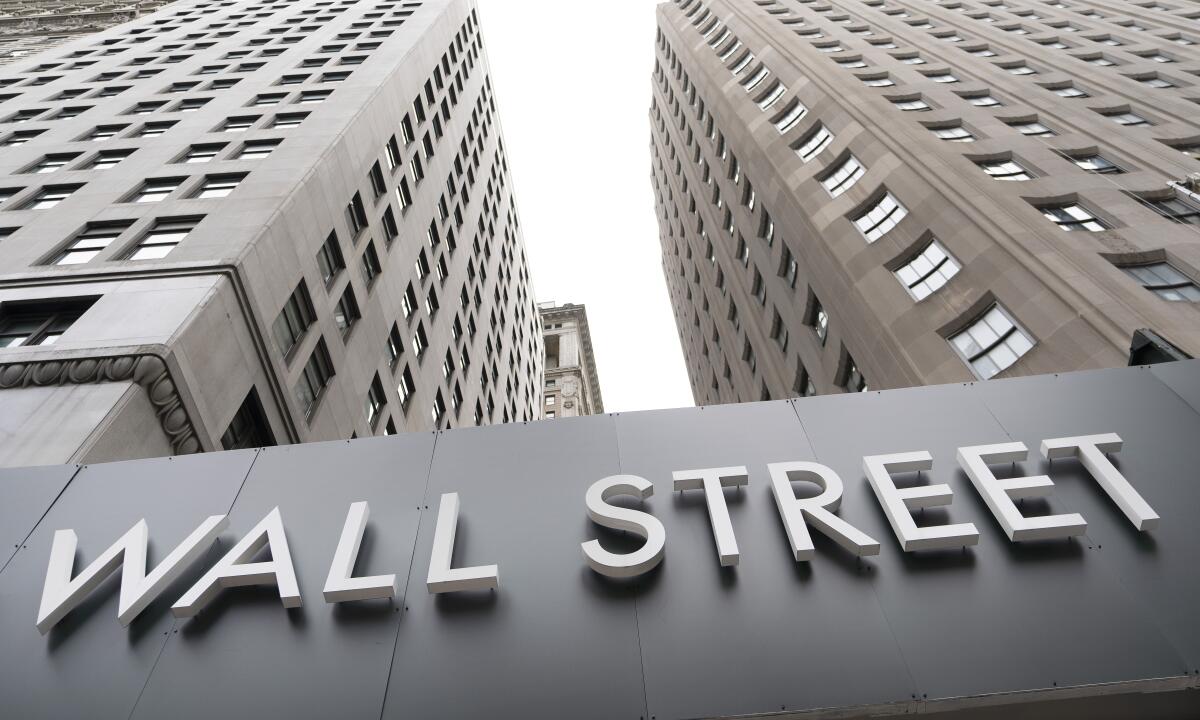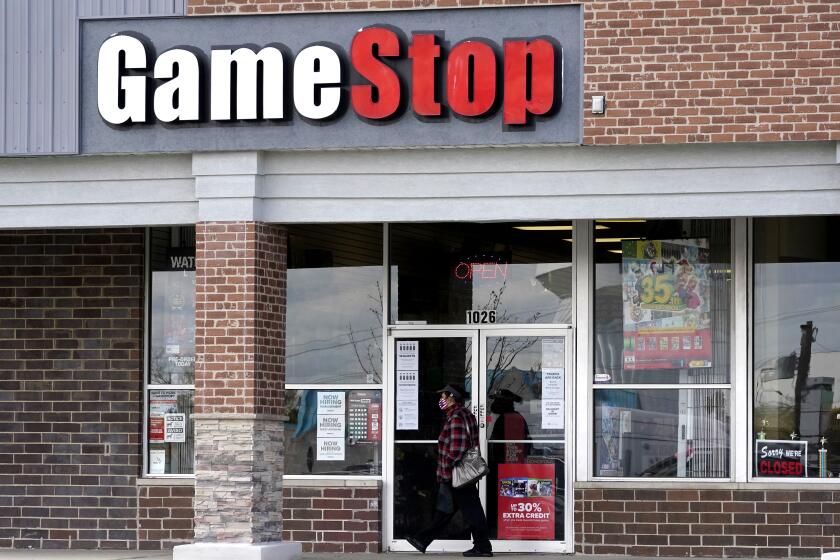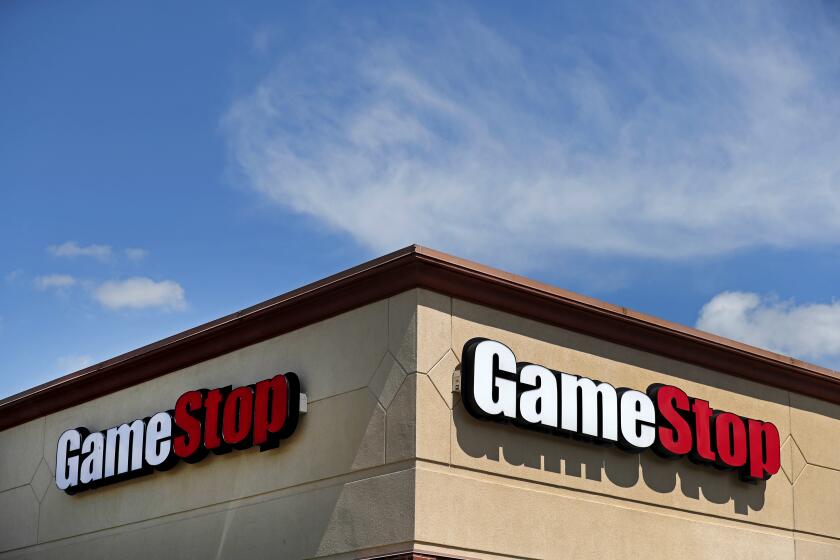GameStop soars again; Wall Street bends under the pressure

- Share via
Another bout of selling gripped the U.S. stock market Friday, as anxiety mounts over whether the frenzy behind a swift, meteoric rise in GameStop and a handful of other stocks will damage Wall Street overall.
The Standard & Poor’s 500 dropped 1.9%, giving the benchmark index its biggest weekly loss since October. The Dow Jones industrial average and Nasdaq each fell 2%.
GameStop shot up nearly 70%, clawing back much of its steep loss from the day before, after Robinhood said it would allow customers to start buying some of the stock again. GameStop has been on a stupefying 1,600% run over the last three weeks and has become the battleground where swarms of smaller investors see themselves making an epic stand against the 1%.
The assault is directed squarely at hedge funds and other Wall Street titans that had bet the struggling video game retailer’s stock would fall. Those firms are taking sharp losses, and other investors say that’s pushing them to sell other stocks they own to raise cash. That, in turn, helps pull down parts of the market completely unrelated to the revolt underway by the cadre of smaller and novice investors.
The GameStop stock-trading frenzy is all about punishing short sellers, but why?
The maniacal moves for GameStop and a few other formerly beaten-down stocks have drowned out many of the other issues weighing on markets, including the coronavirus, vaccine rollouts and potential aid for the economy.
Meanwhile, calls for regulators to step in are growing louder on Capitol Hill, and the Securities and Exchange Commission says it’s carefully monitoring the situation.
The S&P 500 fell 73.14 points to 3,714.24. It ended the week with a 3.2% loss, its worst week in three months. It ended January with a 1.1% loss, its first monthly decline since October. The S&P 500 is still up 13.6% since the end of October.
Some of the heaviest weights on the index were Apple, Microsoft and other Big Tech stocks that have been big winners for professional and other investors over the last year.
The Dow lost 620.74 points to close at 29,982.62, and the tech-heavy Nasdaq composite slid 266.46 points to 13,070.69. The Russell 2000 index of smaller companies gave up 32.97 points, or 1.6%, to 2,073.64.
Other forces also weighed on the market. Johnson & Johnson fell 3.6% after it said its vaccine appears to protect against COVID-19, though not as powerfully as rivals. Analysts said the results, which would require just one shot instead of the two required by other vaccine makers, were below expectations.
Elsewhere, investors watched virus infection spikes in Europe and Asia, renewed travel curbs and negotiations in Washington over President Biden’s proposed $1.9-trillion economic aid package. Hopes for such stimulus for the economy have carried the S&P 500 and other major indexes back to record highs recently, along with enthusiasm about COVID-19 vaccines and the Federal Reserve’s pledge to keep the accelerator floored on its help for the economy. Low interest rates from the Fed can act like steroids for stocks and other investments.
Wall Street’s focus remains squarely on GameStop and other moonshot stocks. AMC Entertainment jumped 53.7%, and headphone company Koss vaulted 52.5%. After their success with GameStop, traders have been looking for other downtrodden stocks in the market where hedge funds and other Wall Street firms are betting on price drops.
By rallying together into these stocks, they are triggering a “short squeeze,” in which a stock’s price can explode higher as investors who had bet on price declines scramble to get out of their trades.
The GameStop frenzy recalls stock market manias of the past. They all end in tears.
The smaller investors, meanwhile, have been crowing about their empowerment and saying the financial elite are simply getting their comeuppance after years of pulling away from the rest of America.
Most of Wall Street and other market watchers say they expect the smaller-pocketed investors who are pushing up GameStop to eventually get burned. The struggling retailer is expected to still lose money in its next fiscal year, and many analysts say its stock should be closer to $15 than $330.
In response, many users on Reddit have said they can keep up the pressure longer than hedge funds can stay solvent, although they often use more colorful language to say that.
This week, Robinhood and other online trading platforms restricted trading in GameStop and other stocks that have soared recently, prompting outrage from individual investors on Twitter and other social media sites. After easing up on some of the restrictions early Friday, Robinhood tightened them again throughout the day, limiting the number of GameStop shares that customers could buy. By 3:03 p.m. Eastern time, they could not purchase any more if they already had at least one share.
The SEC said Friday that it is evaluating “the extreme price volatility of certain stocks’ trading prices,” warning that such volatility can expose investors to “rapid and severe losses and undermine market confidence.”
Both the Senate Banking Committee and the House Financial Services Committee plan to hold hearings on the GameStop controversy.
More to Read
Inside the business of entertainment
The Wide Shot brings you news, analysis and insights on everything from streaming wars to production — and what it all means for the future.
You may occasionally receive promotional content from the Los Angeles Times.












